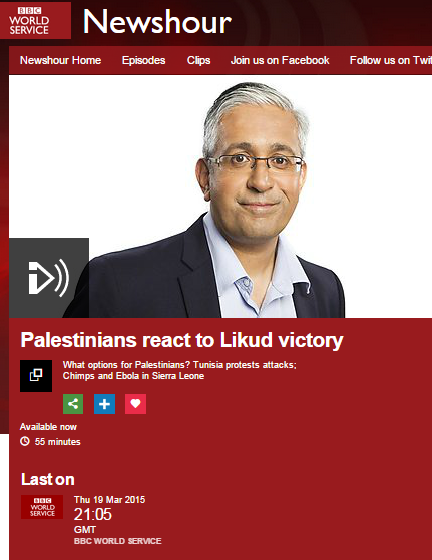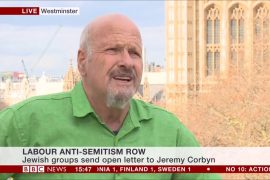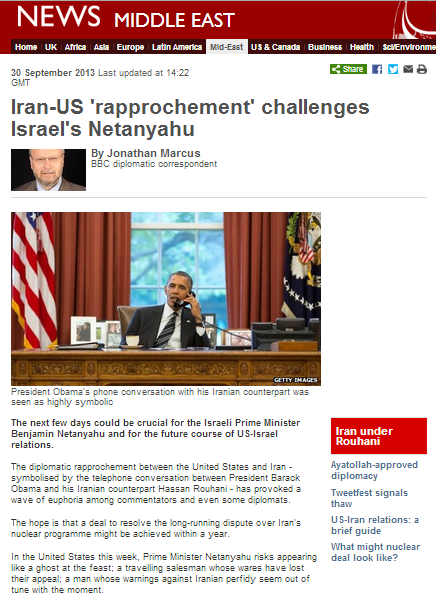As readers who have followed our discussion of the BBC’s coverage of the recent Israeli election will be aware, much of the material produced stubbornly focused audience attentions on a topic which was low down on voters’ lists of priorities: the Palestinian-Israeli conflict. A significant number of the BBC’s reports included commentary on an interview given by the Israeli prime minister to NRG on March 16th in which he said:
“I think that anyone today going to set up a Palestinian state – anyone going to evacuate territory – is simply giving extremist Islam territory for attacks against the State of Israel. That’s the reality which has emerged here in the recent years. Whoever does not understand that is simply putting…burying his head in the sand. The Left does that – it buries its head in the sand time after time.”
When then asked by the interviewer if it was correct to say that “…if you are prime minister a Palestinian state will not be established”, Netanyahu replied “indeed”.
In the March 19th evening edition of the BBC World Service radio programme ‘Newshour’ (available here from thirty seconds in), presenter James Coomarasamy turned that one word into an ‘election pledge’.
Coomarasamy: “…we begin with the continuing fall-out from the Israeli election. On the domestic front the political landscape is unchanged: Binyamin Netanyahu has been reelected to a fourth term. But on the international level it’s becoming increasingly apparent that some of the pledges he made to secure that victory could have serious consequences. In particular, his suggestion that on his watch there wouldn’t be a Palestinian state has further widened the gap between him and the White House. Mr Netanyahu appeared to soften his line today, telling the American television channel MSNBC that he remains committed to Palestinian statehood – or what he called a sustainable, peaceful two state solution – provided conditions in the region improve. Well, the White House spokesman Josh Earnest told reporters that any change in Israeli policy towards a two state solution would mean that America would have to reevaluate its position.”
After hearing a recording of Earnest’s comments, listeners heard two speakers – introduced as follows:
JC: “But first – to discuss the options for Palestinians – I’ve been speaking to Yousef Munayyer, the executive director of the US Campaign to End the Israeli Occupation. He’s a Palestinian citizen of Israel and holds both US and Israeli nationality. I’ve also been speaking to Mustafa Barghouti, the runner-up in the last Palestinian presidential election: was he expecting a change of approach from America?”
Notably, Coomarasamy refrained from informing listeners that the election to which he referred took place in 2005, with no election having been held since and the winner’s four-year term of office having expired six years ago. In breach of editorial guidelines on impartiality, Coomarasamy also made no effort to ‘summarise the standpoint’ of either of his interviewees or to clarify the political ideologies of the organisations with which they are involved. Worse still was Coomarasamy’s failure to challenge Barghouti’s advancement of the ‘apartheid’ trope.
Mustafa Barghouti: “I hope so, but we still have to see. It’s not enough what they said. What we need is actions and not just talks. In reality Netanyahu is trying to deceive everybody. What matters is not only what he says although he said very clearly that he is not going to allow a two state solution and all his statements were racist and practically he officially declared Israel as an apartheid state – a segregation state. Nevertheless…”
JC: “Well yeah…but he did …he said today though…he said he was committed to a two state solution provided the conditions allow it. So he has softened his stance…”
MB: “No, no, no; he is deceiving you. He’s deceiving you, deceiving the world media and deceiving everybody and that’s why I said what matters is what he does and what he does on the ground is settlement activities at a rate that is unprecedented. The settlement activities are destroying the possibility of a Palestinian state. In reality he is conducting a campaign to end the possibility of two state solution and he’s said it to win votes.”
This of course would have been the appropriate juncture for Coomarasamy to clarify to listeners that Barghouti’s claim that “settlement activities” have been “unprecedented” under the governments headed by Netanyahu are inaccurate, but he failed to correct that deliberately misleading impression.
JC: “So what’s…what should the Palestinian reaction be? What calculations are you making at the moment?”
MB: “Well first of all let me say what the United States should say – should do – as you have asked about that. I think the United States and European countries – if they are really committed to Palestinian statehood and to two state solution – they should immediately recognize the Palestinian state. They should send a very clear message to Israel that they are establishing a de facto political fact as to encounter his facts on the ground as well.”
Coomarasamy then brought in Yousef Munnayer – notably without any attempt to clarify the all-important question of the level of commitment of the assorted Palestinian factions to the two state solution.
“YM: “Well…err…I think that it’s very clear where Benjamin Netanyahu stands. Anyone who has followed the career of Benjamin Netanyahu – not just in recent years, but as he came up through the right-wing Likud party – knows exactly where his ideas lie. He is not interested in ever seeing a Palestinian state. For many years the charter of the Likud party which he leads explicitly stated that their position was to flatly reject the existence of a Palestinian state west of the Jordan River, so obviously ruling out a Palestinian state anywhere in the West Bank and Gaza. So nobody should be fooled by anything that Benjamin Netanyahu says. But I think frankly we should not put any credence into the rhetoric of a person who so agilely changes their position on matters of principle in three days.”
Coomarasamy neglected to point out to listeners that the Likud’s updated charter no longer includes such a position whilst at the same time failing to quiz Munayyer on the topic of the Hamas charter – which rejects the existence of Israel outright – and the Palestinian Authority’s continual rejection of Israel’s right to exist. In other words, his failure to ensure the introduction of that essential context – along with the failure to note the repeated rejection of a negotiated solution by the Palestinians – meant that Coomarasamy’s listeners were led to believe that the two state solution is rejected by Israel but embraced by the Palestinians.
JC: “Yes, so what then should the Palestinian position be?”
YM: “I think the Palestinian approach should be to continue to reach out to the international community to raise pressure on Israel. The power dynamics are such that the Palestinians cannot do this by themselves.”
JC: “Well it sounds as though America might be prepared to do that. What did you make of the comments from the White House today?”
YM: “Well I think the White House is now in a very, very difficult position. They have supported Israel unwaveringly for many, many years and the leader of Israel who was just elected with a fairly significant mandate to form a right-wing government spat in the face of established US policy for many years. So this is not something that they can let go quietly; they have to do something. The question is what is it that they are going to do? They’re gonna be exploring their options. I would love to see the United States take a very strong stance right at this moment: break the taboo of support for Israel and say that they are going to be changing their policy until Israel’s behavior matches international law.”
Coomarasamy then steered the conversation to the direction of promotion of the one state ‘solution’.
JC: “But what about the Palestinians? You say that you believe there has never been a realistic chance of Israel supporting a two state solution – what should Palestinians be doing then? Should they be campaigning for equal rights within Israel?”
MB: “I would like to respond to this. First of all I think if Israel kills the two states option of course the only alternative would be one state solution with full democratic rights. But what people should understand; this would be a long journey and a struggle against the system of apartheid that Netanyahu has created. And that means that we need not only Palestinian popular resistance on the ground but also boycott, divestment and sanctions against Israel in the very same manner that was used against the system of apartheid in South Africa at one point in time.”
Coomarasamy made no attempt to relieve his listeners of the erroneous impression that Israel can be legitimately compared to apartheid South Africa or to clarify to them the end game of the BDS movement: the eradication of the Jewish state.
JC: “Popular resistance: do you think this makes war more likely?”
MB: “Yes. Popular resistance – popular non-violent resistance – this is what we are calling for and I think this is the least we can do in front of a government that will include Mr Liberman who speaks about beheading Palestinians and who is speaking about executing the Palestinian prisoners.”
Coomarasamy failed to put those comments into context by explaining to audiences that Avigdor Liberman’s Yisrael Beiteinu party proposed the death penalty for terrorists during its recent election campaign.
JC: “Right. Yousef Munayyer – what are your thoughts then about whether or not Palestinians should simply be campaigning for equal rights within Israel if you don’t think the two state solution is viable?”
YM: “Well I think frankly – and this is where I perhaps…I may disagree a little bit with Dr Barghouti – is that neither outcome is a short journey. Both of these are going to be significant struggles but we really do not have an alternative. The status quo is not something that is morally acceptable as we all know. And I think there will be robust support for a Palestinian civil rights movement should the leadership chose to go in that direction. If you look at American public opinion for example, if you ask Americans what they prefer be the outcome should a two state solution fail to be achievable, as I think is fairly demonstrable at this point, the vast majority say they want to see a single democratic state because these are values that resonate with Americans which have had their own visceral experience with the civil rights struggle in the United States and I think as Israel moves further into the open as an apartheid state, that clash with US values will become more apparent.”
Of course Coomarasamy refrained from reminding his listeners – and his interviewee – that the leaders of the civil rights movement in the United States never negated the rights of others to live there, never negated that country’s existence and certainly did not engage in an organised campaign of (partly foreign funded) violent indiscriminate terrorism against its population.
Regrettably, it is not rare to see context-free promotion of the ‘apartheid’ trope in BBC content. Neither is it unusual to see promotion of the anti-peace BDS campaign without any information being provided to audiences regarding that movement’s real aims. In addition to its mainstreaming of those forms of delegitimisation of Israel, we see in this programme the provision of a sympathetic BBC platform for the promotion of the one state ‘solution’ campaign to bring about the dismantling of the world’s only Jewish state and an end to the right of Jews to self-determination.
Yet again the BBC makes a mockery of its own supposed ‘impartiality’.
Related Articles:
Tips on using the BBC Complaints Procedure




